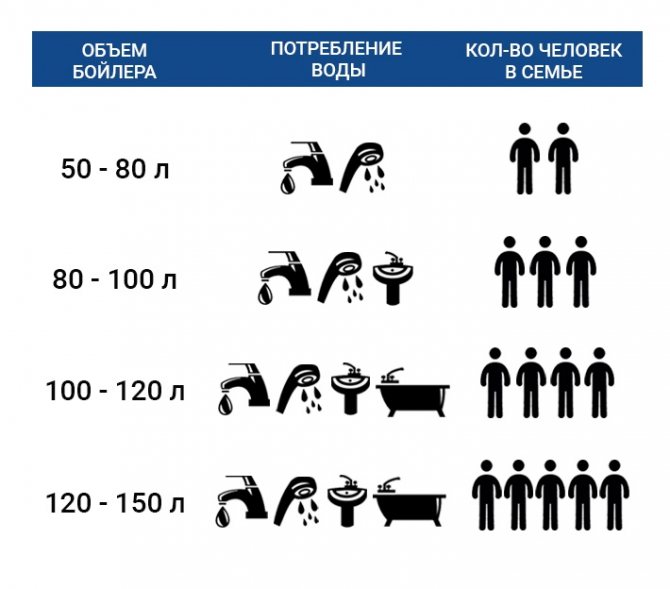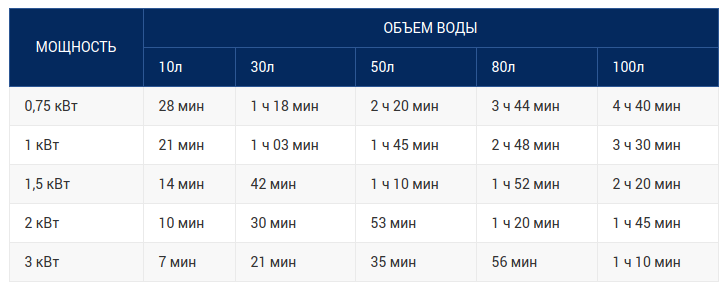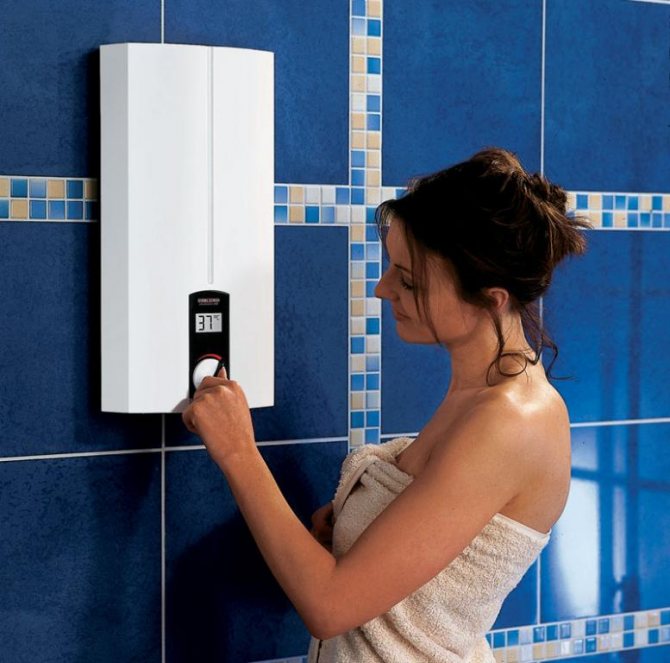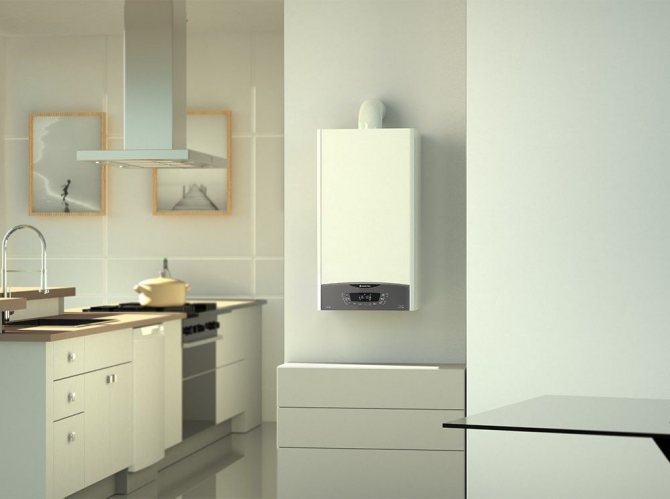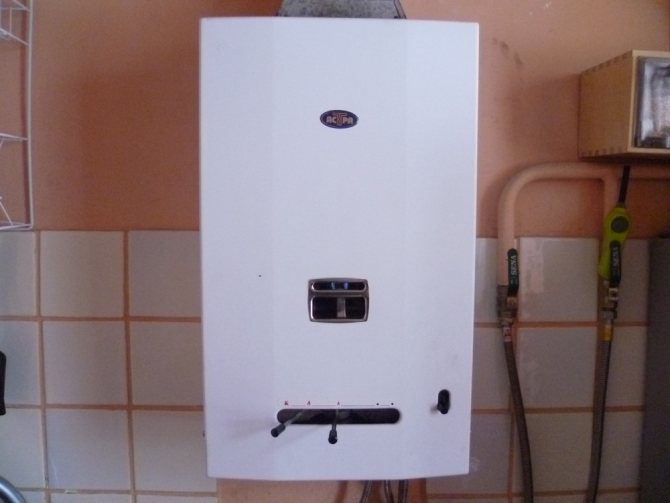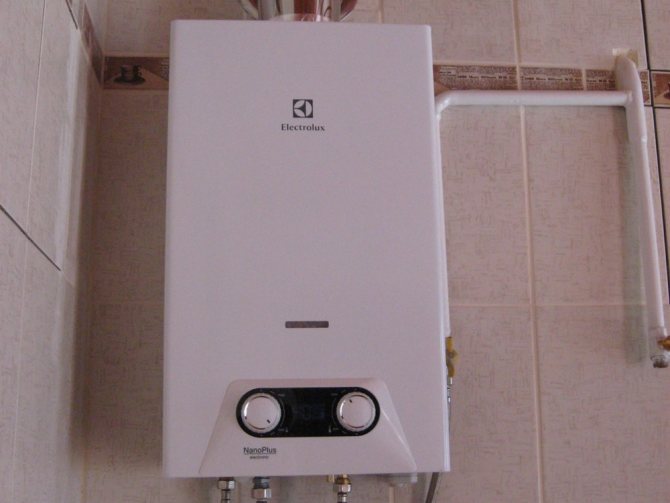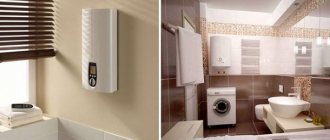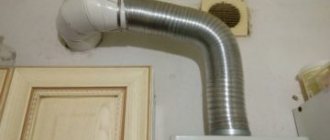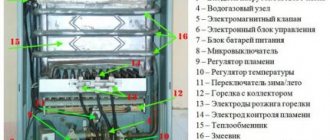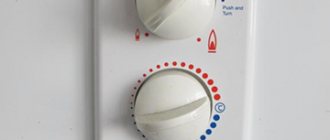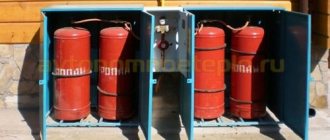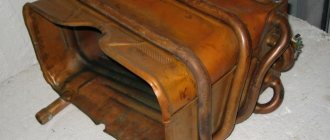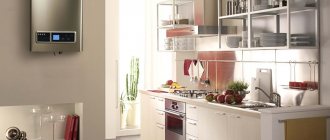Types of heating devices
Heating units are of two types: storage and flow-through. The principle of operation of the first is that first they carry out a collection of water, then they heat it up for a certain time and distribute it through the pipes. The latter heat the circulating water directly during operation.
Depending on what kind of energy carrier they function with, these types, in turn, are divided into electric or gas water heaters.
In general, the following types of water heating devices can be distinguished:
- electric storage heater or boiler;
- flow-through gas heater or gas water heater;
- flow-through electric heater;
- storage gas heater.
Initially, the boiler collects water, which is heated by a water heating element - a heating element, built into the unit.
The principle of operation of the gas column is that the water is heated by the action of the burner flame during its movement in the heat exchanger.
Best of all, the first two types have proven themselves and are most widespread. Therefore, the problem usually lies in choosing between these two options.
Gas water heater
In apartments and houses, the most popular choice is a gas heater. It is easy to use, durable, safe, practical and extremely reliable. In addition, it allows you to heat water much faster than an electric model.
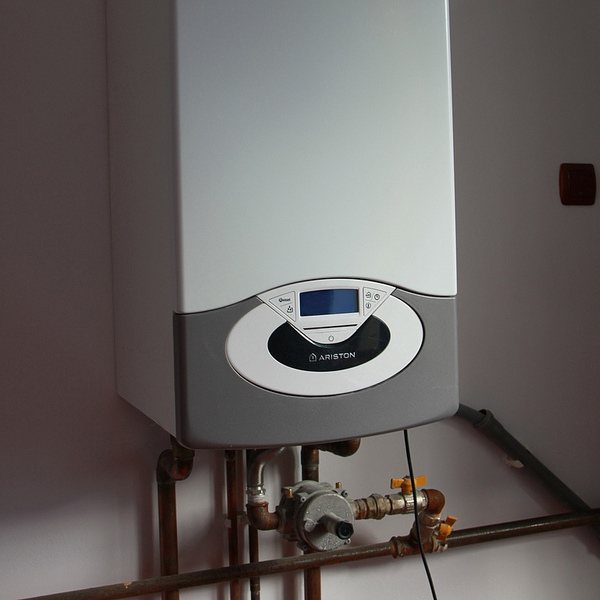
The work of modern devices is fully automated. The burner is ignited when the device is started. At this moment, gas is supplied, and if it is absent, the flame is turned off. The main advantage of this type of water heater is its economy, since gas is much cheaper than electricity.
These heating devices can be of two types:
- Cumulative;
- Flowing.
The first option is mainly suitable for large families who need a large amount of water consumption. In such a situation, you can install a tank with a capacity of about 200 liters, which is enough for two adults and three children to shower. For a small family, the best option is a flow heater. When choosing it, power must be taken into account. When using one point of water consumption, 19-20 kW is suitable, and for the simultaneous use of water in two different places - at least 24 kW.
The advantages of a gas water heater are:
- Optimum gas consumption for heating;
- High efficiency;
- Low cost.
The disadvantage of the device is the need for the installation of an exhaust hood during its installation, since during the combustion of the gas, harmful vapors and products are formed. They need to be taken out on the street in a timely manner.
Positive and negative points
In order for each consumer to be able to decide which is better, a gas or electric water heater, and to make a choice for themselves, we will consider the advantages and disadvantages of both types.
Boiler
Advantages:
- the device does not need a chimney, and its operation does not depend on the presence of ventilation in the room;
- installation is extremely simple, and you do not need to be an expert to cope with this task;
- in devices of the latest generation, the heating element does not come into contact with water in any way, which excludes the formation of scale;
- the operation of the boiler is in no way affected by temperature fluctuations or changes in water pressure in the communications, the hot water supply will remain continuous, and its temperature in the tap will not change.
We recommend that you look at the options for bathroom design in dark colors.
Read: how you can easily clean the tiles in the bathroom.
Disadvantages:
- a relatively small and limited volume of water that can be heated by the boiler: when the water runs out, you will have to wait a rather long time until the next available part is heated;
- large size of the device: in a small room it will take up quite a lot of free space and, possibly, interfere with free movement;
- for a large family, the volume of the boiler, with all desire, is not enough, so in the evening and morning hours you will have to optimize the water consumption or even draw up a schedule.
Gas water heater
Pros:
- instant flow of hot water all the time while the tap is open;
- the modern generation of columns is equipped with electronic control that controls the combustion process, which allows maintaining the temperature of the water in the tap even when the pressure in the pipes changes;
- safe in operation, thanks to the equipment with a large number of sensors that signal the slightest shortcomings.
Negative points:
- the efficiency of gas water heaters is much inferior to a similar characteristic of the boiler;
- a chimney and good ventilation of the room are required;
- models equipped with an open combustion chamber strongly burn oxygen in the room;
- possible malfunctions of the device with fluctuations in the level of pressure of water or gas;
- in severe winter conditions, this type of device may not cope with its task;
- installation work is complex and can only be performed by qualified specialists of an organization that has permits for this type of activity;
- in addition, it is necessary to have a project approved by the gas service.
What is their difference
The main difference between these devices is in the energy due to which they work. The geyser is powered by gas, which is produced by connecting to the central gas pipeline. Such a device was invented a long time ago, and during its existence it has evolved from a bulky unit that requires a lot of space into small compact devices.
The electric boiler has the appearance of a capacious tank with a tubular electric heater inside and a water heating control system outside. There are two types of such devices:
- Flowing - a small device that connects to the water supply pipe and heats the water when the tap is turned on.
- Accumulative - a tank of different sizes that collects and stores water; heats up the water when the tank is turned on.
Unlike a gas water heater, a boiler can work with large volumes of water, therefore, various enterprises often make a choice in its favor.
Comparative analysis of gas and electrical equipment
To answer the question of which water heater is still better: electric or gas, we will carry out a comparative analysis of them for a number of factors.
The financial side of the issue
As with any type of equipment, for both options the price will strongly depend on the characteristics and set of functions of the model.
A geyser will require much more installation costs than installing an electric storage heater. Both types of maintenance are approximately the same in terms of cost. But when paying payments for consumed resources, a gas boiler will be cheaper, since the price of natural gas is lower than the price of electricity.
Which consumes resources more economically?
The amount of electricity consumed directly depends on the power and volume of the device. The required volume of gas, in addition to the power of the column, will also depend on the type of ignition.In the case of the electric type, gas is consumed only at the moment the tap is turned on, but if piezo ignition is used, gas will be consumed constantly, which will affect the amount in the receipt in a larger direction.
Efficiency and safety
The boiler has a higher efficiency, it is extremely easy to install and only needs an outlet and access to the water supply for its operation.
The geyser heats the water faster, almost immediately after opening the tap valve and is more ergonomic, but its installation is much more complicated than installing a boiler, must be carried out by qualified specialists, and use can only be carried out in conditions of centralized gas supply.
Gas poses an increased danger: if the unit malfunctions, there is a danger of explosion, as well as the possibility of poisoning by combustion products.
Which is safer - a column or an electric water heater
The answer to this question is easy to understand by the number of permits required for each type of equipment. Safety requirements stipulate:
- For gas-consuming equipment - preparation of a project for connection and placement, annual inspection of smoke channels, the need for regular maintenance. If any violations are detected, the column is turned off. Installation requirements of gas workers affect the total area of the boiler room, the height of the ceilings. The norms related to accommodation, ventilation systems, etc. are affected. The reason for this attitude is the high probability of a gas leak, an explosion. Often, the gas service simply refuses to install a gas water heater, since the boiler room or house does not meet the technical conditions for connection.
A water heater (boiler) is an indispensable device for residents of rural areas (where there is no centralized heating and water supply) - by installing a boiler together with a home pumping station, you can receive hot and cold water around the clock. But there are also several reasons to install a water heater in an apartment with centralized heating and water supply:
- The quality of the services provided by housing and communal services is not always at the required level
- the water is often not quite hot, and one should not forget about the long summer shutdowns of hot water (repair + modernization of systems); - The cost of a cubic meter of hot water often exceeds the same cost of water heated by its own water heater (it is necessary to calculate based on specific prices in your region).
The market is currently widely there are three types of water heaters - electric, gas and indirect heating.
Electric and gas are heated using electrical energy and gas, respectively, and the indirect heating boiler heats the water when pumping another heat carrier through the built-in coil.
But before proceeding to consider the advantages of each type of water heater, it is necessary to consider the general selection parameters for each type of boiler.
Electric type instantaneous water heaters
In some cases, consumers know for sure that they want to install an instantaneous type of heater. Then the question is much more narrow: to choose a gas or electric instantaneous water heater?
To be able to install and operate this type of heater, a number of conditions must be met. Only an electric stove can be used in the room at the same time, otherwise the available wiring power will not be enough even to install the device. If a gas stove is used, then only a low-power apparatus can be installed, which, of course, will negatively affect its ability to perform its main function.
We advise you to read how to install bath grab bars.
Read: how to make a sliding screen under the bathroom with your own hands.
Find out what features the Tulip shell has.
Installation of such a unit, most likely, will require additional independent wiring and separate protective automation.
The main advantage is the continuous and unlimited supply of hot water immediately after unscrewing the valve, as well as the absence of the need for regular maintenance.
The main danger: if there are problems with the quality of the electrical wiring in the room, then the operation of the device can become not only problematic, but also simply dangerous.
Instantaneous or storage boiler - which is better?
Instantaneous water heaters heat water instantly
, that is, they turn on as soon as the tap opens and heat up the water in the pipe that passes through the boiler. They take up relatively little space (about the size of a shoebox), are cheaper than storage ones (in the segment of electric water heaters), but at the same time are more difficult to install and
they need a lot of energy to instantly heat up water - from 8 kW and more
(if the water heater is electric, then it is necessary to pull separate wires from the meter - otherwise the wiring will most likely not withstand). The source of energy for flow-through boilers is gas or electricity - there is no indirect heating of flow-through boilers.
Depending on your needs, it is necessary to choose the right flow-through boiler of the appropriate power, because a 3.5-4 W flow-through boiler is enough only to wash the dishes and wash (productivity is about 1.5 liters per minute), it will be quite difficult to buy even under the shower - for for this, choose a boiler with a capacity of at least 6 kW (we are already 100% pulling a separate wire from the meter).
Storage water heaters
are a container with water, protected by a heat-insulating material, which is heated to a predetermined temperature by an external energy source, and after that the temperature is maintained at this level. Such water heaters are quite easy to install and use,
the only drawback is that it takes time to heat the water
(approximate times can be found in the table below).
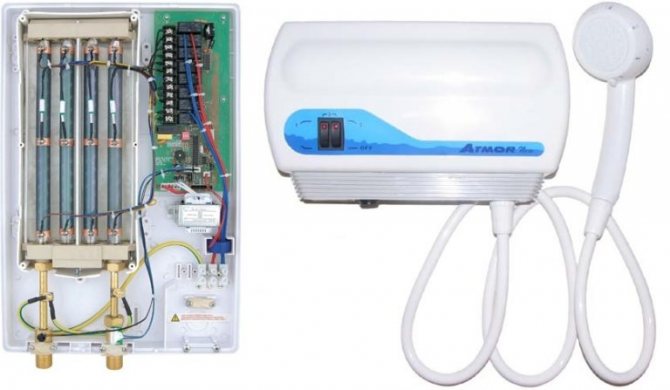

Water heater volume (storage boiler)
If you choose a boiler in the store with an excessive volume for you, you will wait a long time for the initial heating and overpay for the wasted energy (although as a boiler does not insulate, it cools down anyway). But if you stop at a small-capacity water heater, then most likely there will be a constant lack of hot water - you must admit, little pleasant. Therefore, you need to choose a middle ground, thanks to which you can meet your needs for hot water.
The volume of the boiler mainly depends on the number of people who will use it, but the number of points that remove hot water (shower, washbasin, sink in the kitchen, etc.) also quite strongly affects. But also do not forget about such additional parameters as the duration of bathing in the shower (5-25 minutes) and the need for a hot bath.
- Boiler for 30liters
it is quite enough for the needs of one person, well, with a stretch of two, while you will definitely not be able to get a hot bath. Also, such a boiler can be purchased to provide hot water in unforeseen situations (hot water was turned off for a couple of days), even for a large family, but keep in mind that you will have to bathe in the shower in turn while waiting for the water to heat up (since a small volume of water heats up quite quickly). - Water heaters with a volume of 50 liters
are a fairly universal solution for a family of 2-3 people (even four, but you may already have to wait). It is rather difficult to heat the bathroom from this boiler, unless it is completely drained into the bathroom and diluted with cold water (usually the water is heated to 70-80 ° - check!). - Boiler price tag with a capacity of 80 liters
not too different from the cost of 50 liter water heaters, while it is surely enough for 4 people.But it must be borne in mind that with the same heater power, 80 liters will heat up longer. - Water heaters endowed with a capacity of 100-150 liters
and more are usually installed on the floor, or on a specially made stand - it is rather dangerous to hang such a colossus. At the same time, a 150 liter boiler is enough for a large apartment in which about 6 people live. Water heaters with a large volume are designed for installation in private homes - they take up a lot of space and consume a lot of energy. Water heaters with a large volume (150-250 liters) are intended for installation in private houses - they take up a lot of space, consume a lot of energy and have a corresponding price tag.
Is the inner lining of the storage water heater tank - enamel VS stainless steel?
Naturally stainless steel tank
will have great customer confidence - in general, such tanks are just perfect (their warranty period is from 10 years). But there is one nuance - corrosion along the seam, so it is advisable that the manufacturer conducts passivation (protection against corrosion - ask a consultant, find out on the Internet).
But one should not think that steel tanks have internal enameled coating, will be worse or much cheaper than their stainless steel counterparts
- the process of high-quality enamel coating is rather complicated and includes the addition of special additives, due to which the enamel adheres well to steel and expands when heated, having the same expansion coefficient. In addition, there are branded enamel coatings -
deposition of silver ions
(as a result, excellent antibacterial + anti-corrosion properties);
titanium sputtering
(increases heat resistance and ensures uniform heating of the liquid in the tank); glass-ceramic coating.
It should also be noted that most enamels repel scale from themselves and it will gradually accumulate - but the service life of such water heaters is very long.
About repair and maintenance
Storage water heaters need periodic maintenance - once every 1-2 years
... A so-called "anti-corrosion anode" is installed in them, which collects rust and various active chemical substances, protecting the tank. This anode is a consumable item and must be replaced, otherwise the tank will be destroyed in the future. Also, when replacing this anode, it is very desirable to rinse the tank and descale the heating element.
Some useful nuances
Before connecting the electric boiler to a regular outlet, be sure to check the condition of your wiring. A mismatch between the heater power and old wiring can lead to a short circuit and even a fire.
It is necessary to check not only the outlet, but also the distribution meter. In old Soviet-built houses, you may need to install an additional circuit breaker.
Most models of storage boilers are wall-mounted - but some of them can be installed in the space under the sink.
The shape of tanks in storage boilers can be not only classically cylindrical, but also oval. The boiler can also be installed horizontally, so you can fit into almost any interior.
It is desirable that the inner surface of the boiler tank has an antibacterial coating. This will prevent the water from "blooming" when it is stagnant or moldy.
The most effective way to prevent the development of corrosion is a coating in the boiler tank made of the following materials:
- Glass porcelain will delay the formation of rust for 3 years.
- A tank enameled from the inside will last up to 5 years.
- Titanium-based enamel will protect the tank for up to 7 years.
- A stainless steel tank will last about 20 years.
In any case, regular maintenance and cleaning will help to prolong the life of your heating device, and prevent the formation of limestone deposits.
Video - How to choose a water heater
Electric storage system
Benefits:
- For use, the increased electrical performance of the heating part is not required;
- The ability to service several water points;
- Maintains the set water temperature due to high-quality heat insulation.
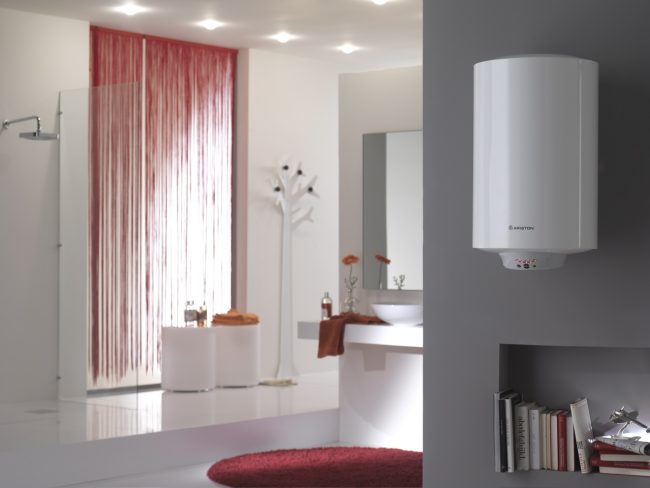

Minuses:
- Large dimensions of the mechanism;
- The water heats up for a long time;
- Electricity is used to maintain the temperature of the water even when not turned on.
If you take into account the described simple rules, even at the purchase stage, you can make an informed choice and buy a water heater that fits the characteristics, rules, and savings rates. Before buying, it is important to read real customer reviews in order to compare models and choose the one that suits the functions and price.
Reading now
- General understanding of electric faucets
- Pros and cons of instantaneous water heaters
- Overview of the features of the toilet with bidet function
- Reliability and durability of gas ball valves
Form and installation of water heaters
Usually we are used to seeing cylindrical water heaters, but there are also rectangular boiler
- especially convenient when installed in a cabinet or stand. There are also water heaters on the market with one narrow edge -
"Slim boiler"
... This design allows you to install such a boiler in a niche or cabinet.
When installing boilers, its weight must be taken into account.
which is approximately (storage boiler with water):
- 30 liters - about 30 kg of wall load;
- 50 liters - about 70 kg;
- 80 liters - up to 100 kilograms;
- 100 liters or more - from 130 kg and more.
therefore a boiler with a volume of up to 80 liters is hung on the wall
(sometimes 100), while the installation should be made in a solid brickwork of the main (bearing) wall or a reinforced concrete panel using anchors. A 100 liter boiler is installed directly on the floor, or hung on the wall making a special floor support from below (even if it is homemade - 100 liters of boiling water is not a joke to you).

